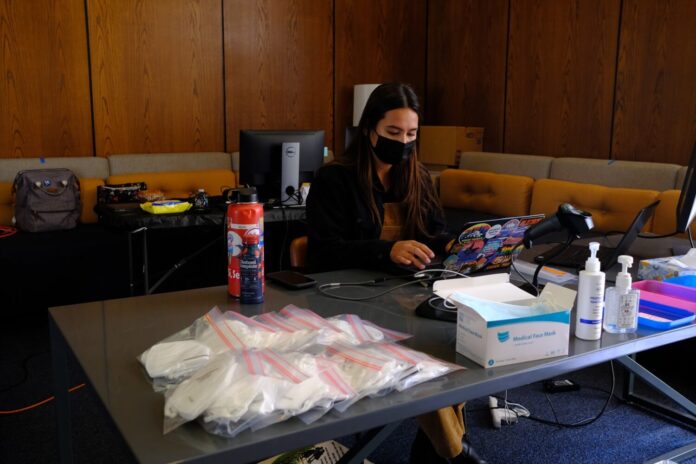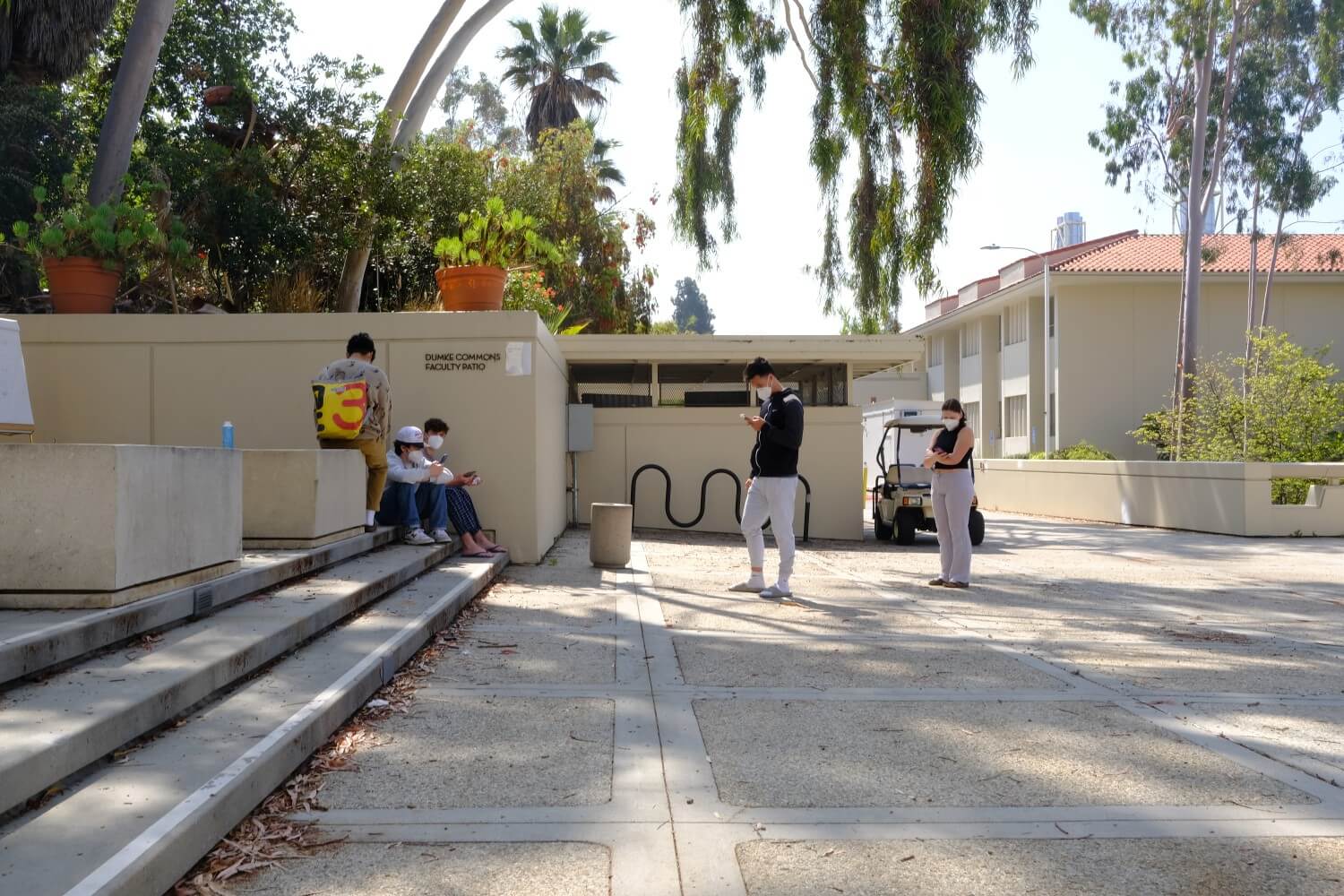
Between March 27 and April 2, 94 students tested positive at Occidental’s COVID-19 testing center — 5.8 percent of all students tested during that period — nearly tripling the previous one-week testing high of 37 cases, according to testing data released April 4. The data also show 99 active cases under management by the college.
The spike in cases follows a change in masking policy, which rescinded Occidental’s mask mandate in many indoor spaces March 23. A March 30 email sent by Assistant Dean of Students for Emmons Wellness Center and member of Occidental’s COVID Operations Group (COG) Devon Sakamoto reinstated mandatory masking and weekly testing for all students, reversing the March 23 policy change. Marty Sharkey, vice president of communications and institutional initiatives and co-chair of COG, said COG does not have any plans to move classes back online at this time.
“The timing might look interesting, but I don’t think it’s the case that because the mask rules changed on Thursday, cases shot up,” Sharkey said.
Sharkey and Sakamoto said the recent emergence of the more transmissible BA.2 omicron variant and the relaxation of LA County COVID-19 policies are the two primary causes of the high transmission rate on campus. Sakamoto also said a few off-campus social events were identified as specific sites of transmission among Occidental students.
“You had county regulations changing weeks before, and I think that gives people a false sense of security. They feel relaxed,” Sharkey said. “I think those things, with the emergence of the BA2, were big factors.”

Emily Marks (senior) is a student assistant at the testing facility in the Arthur G. Coons (AGC) administrative center. Marks said that when she arrived to work on March 28 at 10 a.m., 11 students had already tested positive. She said this was shocking in comparison to the typical number of daily cases, which ranges from zero to two. Half an hour later there were six more cases.
“It was just extremely fast-paced compared with other weeks,” Marks said. “A lot more people had been flooding into the AGC asking for rapid tests. It felt like every five minutes, someone was asking for a rapid test or said that they were exposed.”
Marks said that watching the case numbers rise firsthand made her worried about the relaxed masking policy, which had not yet been reversed at the time.
“I did get a little worried when I found out that the cases were rising. And it did make me wonder if the reason for the increase of cases was because of more relaxed masking protocols,” Marks said.
Marks said she is unsure whether students will take preventative measures in response to the rising number of cases.
“[My boss] was asking myself and another student worker if we think that events are going to be happening on campus, or if people are going to lay low a little bit because of the rise of cases,” Marks said. “The optimistic side of me wants to think that people are going to take it more seriously and prioritize their health and other people’s health, but also I don’t know, I feel like people still might go out and it’s just really hard to know who’s been exposed.”
Marks said she hopes the spike in cases will only be temporary.
“I’m really hoping that this week was just an outlier and a very special circumstance,” Marks said. “And I feel like only time can really tell. I think a lot of it depends on this weekend.”
An April 1 email from Rob Flot, vice president for student affairs and dean of students, urged students to exercise caution the weekend of April 2.
“While we have all played our part, and LA County has recently relaxed some directives, COVID-19 is not yet behind us,” Flot said in the email. “We have been effective at managing COVID-19 at the College, and with your ongoing patience and support, I believe we will continue to do so.”
Sakamoto and Sharkey both said none of the infected students have reported any serious symptoms.
“We have only seen low-level symptoms,” Sakamoto said. “I don’t want to minimize anyone’s experience with COVID because it’s still not going to be fun if people get it, but it has been low to no symptoms so far.”
The now-rescinded change in mask policy was outlined in a March 23 email from Sakamoto which said masking would only be required in specific indoor spaces — including classrooms, residence hall common areas, Emmons Wellness Center and indoor events with over 100 people — and would no longer be required in spaces such as the Marketplace or Academic Commons.
Sakamoto’s March 30 email reversed those changes, reinstating masking in all indoor spaces except inside private offices and dorm rooms.
“While we cannot control the impact of relaxed masking rules across the county, consistent with our past practice we believe it is prudent to take appropriate steps now to limit the risk of transmission on campus and among the Oxy community,” Sakamoto said in the March 30 email.
Before spring break, COG decided to hold off on any change to COVID-19 policies until the college was able to gauge case numbers once students returned to campus, according to Sharkey. Upon return, student case numbers appeared to be steadily going down, according to Sakamoto, which is what inspired the change in policy.
“We kind of eased up on some of the restrictions, because what we were seeing in our community was numbers going steadily down and staying down,” Sakamoto said. “And what we saw this week was numbers going back up.”
In terms of what the campus can expect regarding guidelines going forward, Sakamoto said COG will reevaluate policies in accordance to campus case numbers as well as county recommendations.
“We’re going to continue to look at what’s happening on campus,” Sakamoto said. “So when numbers go up, we’re going to be stricter. And when numbers go down, we’re gonna make decisions then.”
Marks said Occidental students owe it to each other to stay safe as cases spike.
“We all hold a social responsibility to keep ourselves and other people safe,” Marks said. “Especially at a place like Oxy, where everything is so integrated, and everyone is so connected with one another. We have to be even more careful about the way we approach COVID.”
![]()






























